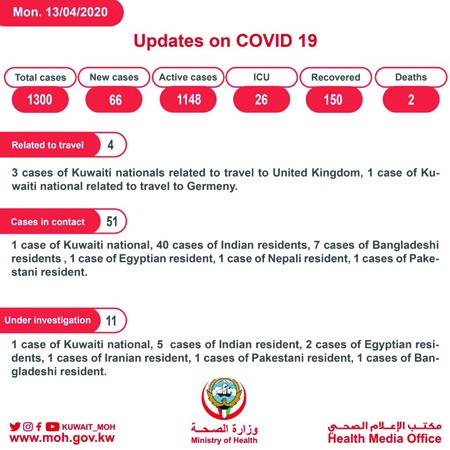
By B Izzak and Agencies
KUWAIT: The ministry of health yesterday reported 66 new coronavirus cases and one death of a 50-year-old Kuwaiti man, raising the total number of cases to 1,300 cases and deaths to two. Of the new cases, 45 are Indians, eight Bangladeshis, six Kuwaitis, three Egyptians and the rest of various other nationalities. As many as eight recoveries were reported, raising the number to 150.
Meanwhile, the Cabinet was expected to choose between expanding a lockdown on other residential areas and imposing a nationwide curfew in a session late yesterday. A small government committee has prepared studies on what is best for the country in its bid to stem the spread of the coronavirus in the face of a steep rise in the number of cases, especially among expatriate workers.
Last week, the Cabinet placed Jleeb Al-Shuyoukh and Mahboula, home to more than half a million expatriates, under lockdown, and began a testing drive for coronavirus. The overwhelming majority of new coronavirus cases in the past few days have been detected among expatriates, especially Indians, whose cases have exceeded half of the 1,234 reported cases in Kuwait.
In the meantime, the government will operate just under 200 flights over a span of eight days starting Thursday to repatriate more than 40,000 Kuwaitis who have been stranded overseas because of the coronavirus outbreak. Kuwait Airways and Jazeera Airways will operate a majority of the flights, but will also be assisted by a number of flights by Qatar Airways. The first flights back home will start from neighboring Gulf states.
The government has stepped up preparations to receive the large number of citizens by booking some 14 hotels to convert them into quarantine sites if needed. The plan calls to test citizens on arrival, and if necessary, send them to quarantine, otherwise they will be allowed to go home provided they undertake to quarantine themselves at home.
Local media reports meanwhile said authorities are seriously studying old plans that had proposed to substantially cut the number of expatriates and make them equal to the number of citizens. The plans mean that over the next five years, Kuwait must take measures to reduce the number of the 3.3 million expats to just 1.5 million, a proposition that seems to be extremely difficult to achieve, given that there are over 700,000 domestic helpers in the country.
Opposition MP Mohammad Al-Mutair called on the interior and social affairs ministers to refer all visa traders to the public prosecution. He said that it is not acceptable that only one officer is responsible for visa trading, adding that the authorities have ample information to refer many more to court, "otherwise we will use our constitutional tools".
Elsewhere, the United Arab Emirates has launched an online marriage service that allows couples to wed amid restrictions on movement and interaction imposed to counter the deadly coronavirus. The justice ministry said on Sunday that citizens and residents can set a date for an online wedding ceremony conducted via video link with a cleric after their paperwork is submitted and approved -also online, according to the UAE's official news agency WAM.
The procedure will see a cleric confirm the identity of the couple and witnesses, before a marriage certificate is relayed to a specialized court for validation. The couple will receive confirmation of their marriage certificate via text message. The service was launched "to maintain the health of the public and that of people working in courts and to limit the presence of employees", WAM reported.
This comes after Dubai, one of the seven emirates that make up the UAE, said on Wednesday it suspended "until further notice" marriages and divorces in the emirate. No announcement has been made about divorce proceedings. Dubai has temporarily restricted the movement of people and vehicles, except for those working in "vital sectors" and with "essential needs" - such as food or medicine.
The UAE also warned it would review labor ties with countries refusing to take back citizens, including those who lost their jobs or were put on leave, and said it was considering strict quotas for work visas issued to nationals of those states. "Several countries have not been responsive about allowing back their citizens who have applied to return home under the current circumstances," the Human Resources and Emiratization Ministry said, without specifying which countries.
India's ambassador to the UAE said on Saturday the country cannot repatriate large numbers of nationals while trying to combat the virus at home. "Once the lockdown in India is lifted, we will certainly help them get back to their hometowns and their families," Pavan Kapoor told the Gulf News daily. Pakistan's ambassador said the embassy was waiting for permission from Islamabad for repatriation flights and was hoping for "positive news soon". "We are very keen to bring Pakistanis back but we need to finalize our treatment and quarantine facilities," Ghulam Dastgir told Reuters.










